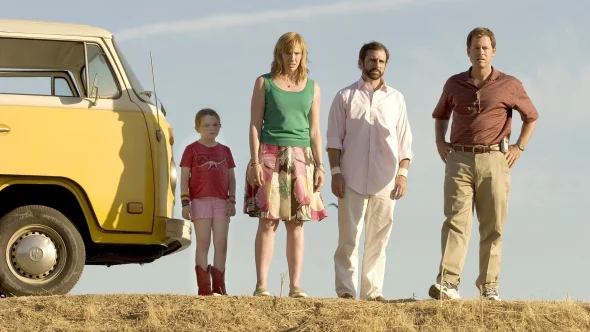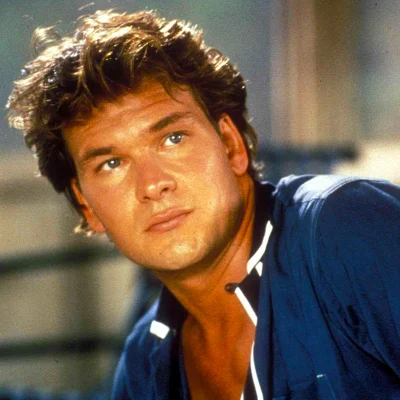
Nikole Beckwith is the writer and director of Stockholm, Pennsylvania and the new film Together Together, which follows the relationship between a single father-to-be (played by Ed Helms) and his surrogate (Patti Harrison). In 2012, Nikole became a Nicholl Fellow for Stockholm. For A.frame, she shares six films that, much like her latest, showcase a different kind of love. For more on Nikole’s journey and films, read our feature on the filmmaker.
Our vocabulary hinders us. I think it’s hard to say “non-romantic” love because I do think there’s romance in friendship. What is more romantic than feeling seen and having someone allow themselves to be seen by you? There is no greater romance.
I think non-sexual love is the majority of the loves that we experience in our life. I blame fairy tales for why we’re so focused on romantic love. You hear that as a story all through growing up. Then, if you’re a person who grows up to make stories, that’s what you’ve been taught is the gold at the end of the narrative rainbow. And other people grow up watching those stories, and it’s a self-fulfilling ouroboric thing and we’re trapped in it. But if you look at your life, there are a lot of different loves in there.
Giving space and allowing those relationships and connections to hold importance also takes the pressure off romantic relationships. The more we can expand our appreciation, narratively and otherwise, of all the different types of love that we have in our life, the more we take the pressure off of people we’re dating or living with or marrying to be the main pillar. If our movie Together Together is part of being able to celebrate that or expand those definitions, that’s quite an honor, but I do think it’s really the audiences that move perspectives forward and storytelling forward. It’s up to you.
It’s a foreign film that came out some years ago, about a girl who has this dog, and her father, when he gains custody of her, unceremoniously kicks the dog out of the car, onto the side of the road. You follow the dog and his determination and perseverance and resilience, eventually, to a reunion. It’s a very intense movie. As I’m describing it, I could be describing a Benji movie from 1985, but it’s a very different feeling.

Another animal-based choice. It’s a French film set in British Columbia in 1885. I watched that one quite a lot as a child. It resonated with me because it felt similar to watching National Geographic. It’s about a young bear whose mother is killed, and then the cub is on its own and finds an older male who does not want to take care of it; but the cub is very attached. There’s almost no speaking through the whole film. The vulnerability of this cub out alone, the grief and the loss of its mother, and the perseverance of asking to be taken care of—asking for what you need despite rejection—was so moving.
Then the older bear comes around. There’s a moment in the movie where that bear could completely maul this horrendous poacher. The man doesn’t have his gun, he’s stuck in there. He’s a snack, basically, and he has been an irredeemable person through this. The bear is screaming in his ear, and the man is sobbing, preparing to die. Then, the bear leaves the man sobbing and broken, takes the cub, and lets him live. He shows a mercy that the poacher himself would never show. That was very impactful for me as a kid. I think I’ve seen the movie hundreds of times. It has a lot of different kinds of love—and forgiveness and compromise and surrender—that I think were all really formative for me.

Those women, what a love story. What a commitment to each other. I don’t have to say anything about Thelma & Louise—what an incredible movie.

I think it is one of the best movies I’ve ever seen about straight male intimacy. I was very moved by that film. I’ve seen it a couple of times. It’s very unexpected.

I love that movie. The whisper at the end… I love not knowing what’s said. I love allowing characters privacy and their own sacred moments. I cried a nice beautiful cry in that moment.
I know some people think of Lost in Translation as being sexual, but it’s not. It bothers me when people say, “But there was this, and there’s that.” Love is a spectrum; there are different shades of attraction. You can be drawn to someone and it can feel romantic, but that doesn’t mean it’s sexual, and it doesn’t mean that the dream or hope or outcome would be physical in any way. Intimacy is nuanced and connection is nuanced, and that’s what I really love about that film. And, of course, the loneliness. In Together Together, they self-identify as being loners, but not necessarily lonely. I thought [Lost in Translation] was a beautiful story and beautifully done.

It’s a great movie about familial love. Steve Carell running into the hotel to register his niece before the deadline’s up makes me cry 100% of the time. To run as an adult towards something, God, that’s beautiful—and how redeeming. What a beautiful moment for that character and his sorrow and trouble to have something to run towards and to have it be the registration for the competition. I’m welling up just thinking about it.






